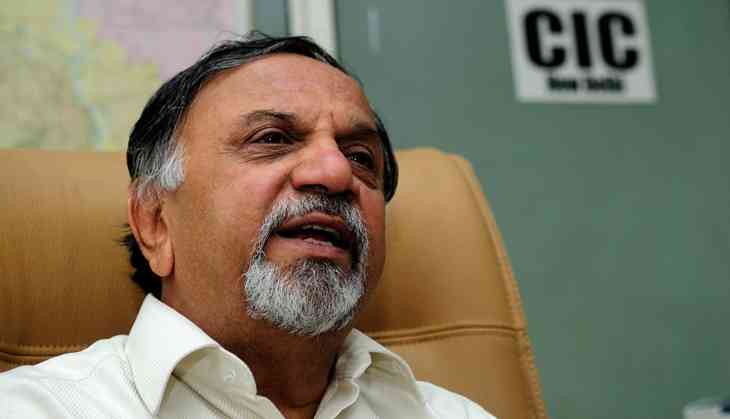RTI movement being discredited: Shailesh Gandhi on jail sentence for Nikhil Dey

Former Central Information Commissioner Shailesh Gandhi has launched a petition to support well-known RTI activist Nikhil Dey who has been handed a jail sentence. The petition, created on Change.org, appeals to President Pranab Mukherjee to intervene against the jail sentence handed out to Dey and four others in a 20-year-old case.
Dey and four other activists - Naurtibai, Ram Karan, Babulal and Chotu Lal Malakar – were recently sentenced to four months in jail by a Munsif Magistrate Court at Kishangarh in Rajasthan. All five are members of the Mazdoor Kisan Shakti Sangathan, a grassroots organisation that led the RTI movement in Rajasthan.
They were convicted of "trespass and hurt" in the case that has been languishing since 1998. The Sarpanch of Harmada panchayat had lodged the case against them when they had gone to his house to deliver a letter pertaining to investigation of his alleged role in incidents of corruption in development projects. The activists allege that it was, in fact, the Sarpanch who assaulted them and then filed a fake against them.
In his petition, Gandhi has said that Dey and his associates are champions of RTI and were leading the nation-wide RTI movement in Rajasthan in 1998.
They, according to Gandhi, had visited the Sarpanch to get information from public records since they had already visited government offices 73 times. They were carrying an official order from the BDO to the Sarpanch to show the records and since that would have exposed corruption, the Sarpanch assaulted them and lodged a false police case.
Gandhi has called the prison sentence for the activists “an attempt to discredit the beginning of the RTI movement, its pioneers and champions” and that this is “the most serious attack on citizen's fundamental rights”. Catch spoke to Gandhi on the case, his expectations from the President and the perils of the RTI movement. Here are edited excerpts of that interview.
CK: What do you know about this case as well as about Dey and his associates?
SG: I Have known Nikhil Dey and Aruna Roy for 10-12 years. I have also met Naurtibai a few times. They are the most non-violent of all activists one would have ever met and I know that they simply will not resort to violence. Plus, there isn't any evidence against them. It is only a case of the word of the Sarpanch vs theirs. No one else was present on the location. The Sarpanch's version of events has just been accepted, rejecting the statements of others. If someone like Dey can be charged of “trespass and hurt”, it is troubling.
CK: Is this a one-off case or you can see a pattern?
SG: There is indeed a pattern because RTI has become a major inconvenience for those who see transparency as a threat. This is a backlash. There have been murders of at least 59 RTI activists and numerous reported assaults and threats. Then there a large number of assaults that go unreported. To cap it all, statements against RTI have been made from the highest quarters, including Prime Ministers, previous and serving.
“Frivolous RTIs” has become a term to discredit the institution of RTI. Even the Supreme Court has passed strictures detrimental to RTI. Take a look at para 37 of the SC's judgement in the CBSE vs Aditya Bandopadhyay case of 9 August, 2011. It says, “The Act should not be allowed to be misused or abused, to become a tool to obstruct the national development and integration, or to destroy the peace, tranquility and harmony among its citizens.”
You must read the entire para. RTI stems from Right to freedom of speech and expression and to my mind, there can be no misuse of a fundamental right. If there are shortcomings, then those exist in all spheres, but it is only the misuse of RTI that is is singled out. The truth is, everybody in power dislikes RTI and an atmosphere is being created against it.
CK: Your petition is not very specific in terms of what are you demanding from the President. What would you expect him to do?
SG: See, frankly, I first thought of marking the petition to Mahatma Gandhi. Or God.
CK: Because you have little hope from everybody else?
SG: But then I thought that would make the petition frivolous. So then I decided to address it to the President and appeal to him for action. At the end of the day, the President can make a difference to things. At the very least, he could say that this is wrong and it must not be done.
CK: Going beyond this case, what else do you think needs to be done to salvage the RTI movement?
SG: First of all, people should believe that there is no question of misuse of RTI. RTI leads to transparency and no amount of transparency is bad. Secondly, information commissioners should be chosen more carefully because many of them have also been found referring to frivolous RTIs and misuse of RTI. Then, Section 4 of the RTI Act is very important.
CK: About voluntary disclosure of information by all government departments?
SG: Not just that, there is another important aspect that is often overlooked, which is about computerisation and networking in government departments to facilitate transparency.
First published: 17 June 2017, 20:39 IST


